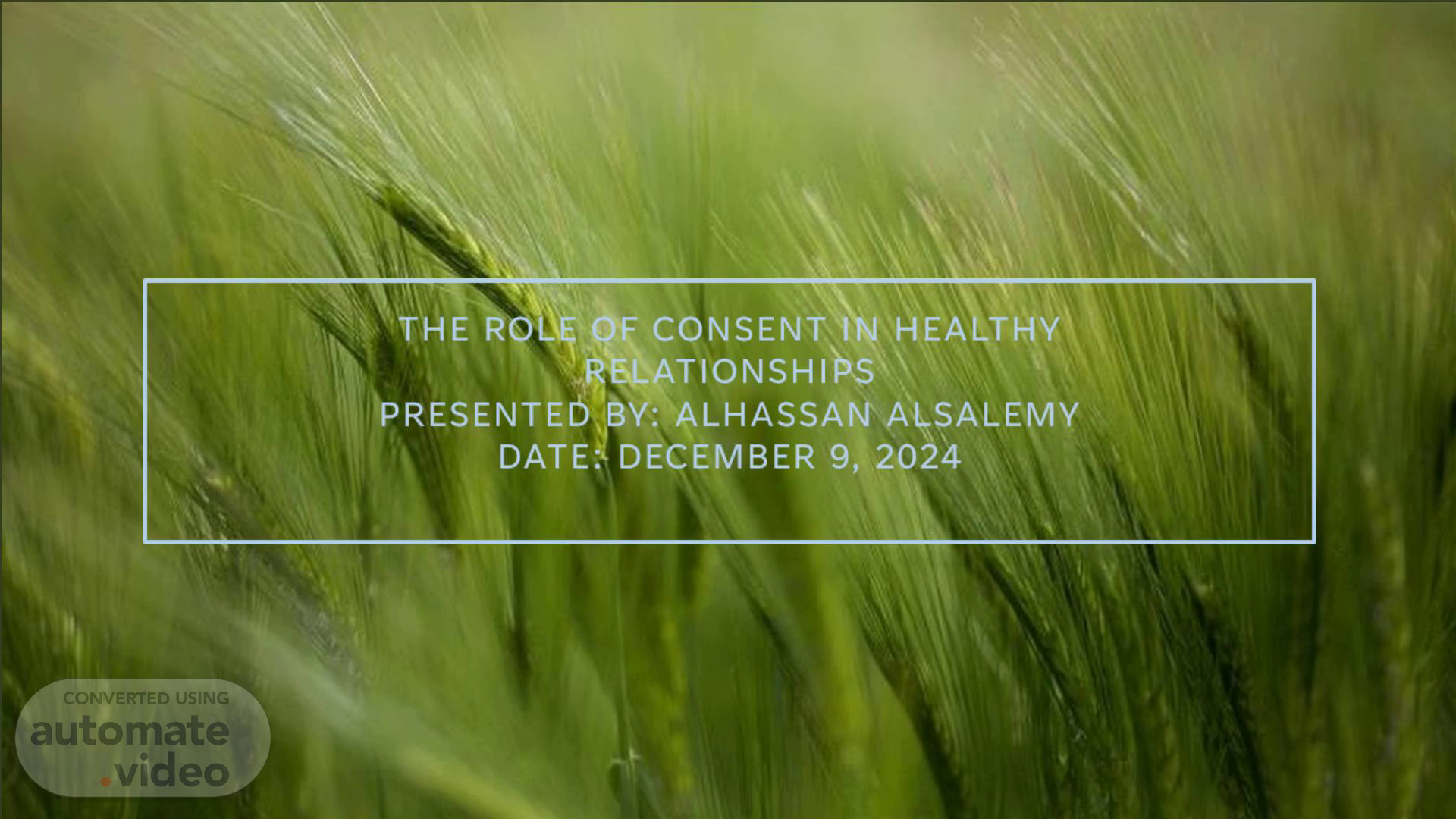
The Role of Consent in Healthy Relationships Presented by: Alhassan Alsalemy Date: December 9, 2024
Scene 1 (0s)
[Audio] Welcome to this presentation on The Role of Consent in Healthy Relationships. I'm Alhassan Alsalemy, and today we'll explore what consent means, why it matters, and how to practice it effectively..
Scene 2 (13s)
[Audio] Consent is the foundation of healthy relationships. In this presentation, we'll define consent, discuss its importance, and provide practical advice to ensure mutual respect and understanding in all interactions..
Scene 3 (32s)
[Audio] I chose this topic because understanding consent is essential, especially among college students. Many young adults face uncertainty about what constitutes consent, which can lead to misunderstandings or harm. By addressing this, we can foster healthier, safer relationships and promote a culture of respect..
Scene 4 (54s)
[Audio] This presentation is tailored for college students aged 18 to 24. At this stage, individuals are forming significant relationships and exploring their independence. Learning about consent equips us with the tools to navigate these experiences confidently, fostering mutual trust and respect..
Scene 5 (1m 12s)
[Audio] Consent is about agreement and communication. It must meet these five criteria: • Freely given: Consent should never be forced or coerced. • Reversible: Anyone can change their mind at any time. • Informed: Both parties must fully understand what they're agreeing to. • Enthusiastic: Consent should be willing, not reluctant. • Specific: Agreeing to one activity doesn't imply consent to others. Understanding and practicing these principles ensures that all interactions are respectful..
Scene 6 (1m 49s)
[Audio] Why does consent matter so much? It's the foundation of trust and communication. Without it, relationships can lead to harm, mistrust, or misunderstandings. Studies show that practicing consent strengthens bonds and reduces conflicts, contributing to a culture of respect and safety..
Scene 7 (2m 10s)
[Audio] Here's some data to highlight the importance of consent education: • 1 in 3 college students reports not being educated about consent in their formative years. • Schools with consent education see a 20% decrease in interpersonal conflicts. • About 50% of young adults admit to being unsure of what constitutes consent in certain scenarios. These numbers show the urgent need for more awareness and education.
Scene 8 (2m 36s)
[Audio] Let's talk about practical ways to practice consent: • Ask open-ended questions like, 'Are you okay with this?' • Respect boundaries without applying pressure or guilt. • Watch for nonverbal cues like body language and tone. • Revisit consent regularly as circumstances change. • Foster a safe environment where both parties feel comfortable expressing their boundaries. These steps create a foundation of trust and understanding..
Scene 9 (3m 4s)
[Audio] Let's address some common misconceptions: • 'Silence means yes': This is false. Consent must be explicitly communicated. • 'Once given, always valid': Consent can be withdrawn at any time. • 'Only applies to physical relationships': Consent also applies to digital and emotional boundaries. Understanding and dispelling these myths is critical for fostering healthy relationships..
Scene 10 (3m 31s)
[Audio] Active listening is a cornerstone of practicing consent. It involves paying full attention to the other person, avoiding interruptions, and reflecting back to ensure understanding. By truly listening, we show respect for the other person's feelings and boundaries..
Scene 11 (3m 49s)
[Audio] Consent is just as important in long-term relationships as in new ones. Regularly check in with your partner about their boundaries and preferences. Remember, comfort levels can change over time, and mutual respect should always guide your interactions..
Scene 12 (4m 6s)
[Audio] Peer education is a powerful way to spread awareness about consent. Student-led workshops, discussion groups, and social media campaigns can help normalize conversations around boundaries and respect. Sharing real-life scenarios can also help peers understand and practice consent effectively..
Scene 13 (4m 25s)
[Audio] Media plays a huge role in shaping how we view consent. Positive portrayals in movies and shows, challenging harmful stereotypes, and advocating for clear communication on social platforms can all help shift societal norms toward greater respect and understanding..
Scene 14 (4m 45s)
[Audio] To conclude, consent is the foundation of trust and respect in relationships. It's not just a guideline; it's a commitment to mutual understanding and safety. By practicing active listening, fostering open communication, and promoting consent education, we can create a culture where respect thrives. Let's all prioritize consent in every aspect of our lives..
Scene 15 (5m 11s)
[Audio] This presentation is informed by reputable sources, including Planned Parenthood, RAINN, the CDC, and the National Sexual Violence Resource Center. These organizations provide valuable resources on understanding and practicing consent..